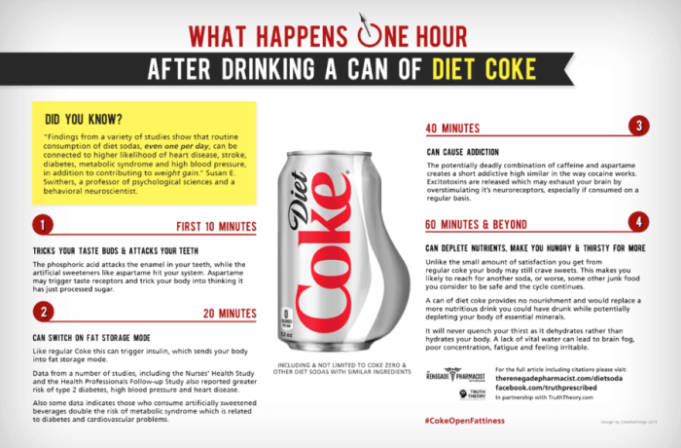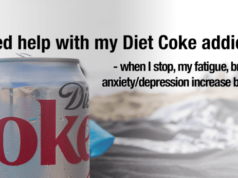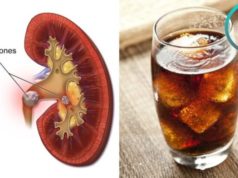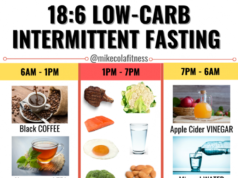Can diet coke cause diarrhea? This question has sparked curiosity among those who enjoy the fizzy beverage and experience occasional digestive discomfort. While the answer isn’t a simple yes or no, exploring the ingredients, individual sensitivity, and potential triggers can shed light on the complex relationship between Diet Coke and gut health.
Diet Coke contains artificial sweeteners, caffeine, and other ingredients that can affect digestion. Artificial sweeteners, particularly aspartame, have been linked to gastrointestinal issues in some individuals. Caffeine, a stimulant, can also trigger digestive upset, especially when consumed in large quantities. However, the extent to which these ingredients contribute to diarrhea varies greatly depending on individual factors.
Diet Coke Ingredients and Potential Digestive Effects
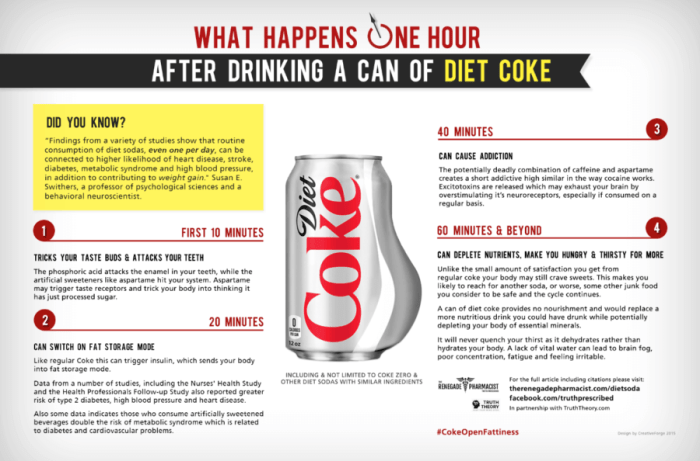
Diet Coke, like many other carbonated beverages, contains a blend of ingredients that can potentially impact digestion. While some individuals experience no adverse effects, others may find that consuming Diet Coke triggers digestive discomfort.
Artificial Sweeteners and Gastrointestinal Health
Artificial sweeteners, particularly aspartame, are a key component of Diet Coke. Aspartame is a non-nutritive sweetener that provides sweetness without adding calories. However, research suggests that aspartame may contribute to gastrointestinal issues in some individuals.
- Aspartame is metabolized in the gut, producing methanol, formic acid, and phenylalanine. These byproducts may disrupt the delicate balance of gut bacteria, potentially leading to bloating, gas, and diarrhea.
- Several studies have reported a correlation between aspartame consumption and digestive symptoms, although more research is needed to establish a definitive link.
- Some individuals may be more sensitive to aspartame than others, and their digestive systems may react differently to the sweetener.
Caffeine and Digestive Issues
Caffeine is a stimulant that can have a variety of effects on the body, including the digestive system. While caffeine is generally considered safe in moderate amounts, excessive consumption can lead to digestive problems.
- Caffeine can stimulate bowel movements, potentially leading to diarrhea, especially in individuals who are sensitive to its effects.
- Caffeine can also increase stomach acid production, which may contribute to heartburn and indigestion in some individuals.
- Research has shown that caffeine can delay gastric emptying, which means food stays in the stomach for longer, potentially causing bloating and discomfort.
Examples of Individuals Experiencing Digestive Discomfort
Many people have reported experiencing digestive discomfort after consuming Diet Coke. Some individuals have noted a correlation between Diet Coke consumption and bloating, gas, diarrhea, or heartburn.
“After drinking a can of Diet Coke, I always feel bloated and experience some gas. I’ve noticed that this happens more often when I drink it on an empty stomach.” – Anonymous
“I used to drink Diet Coke regularly, but I had to stop because it started giving me diarrhea. I’ve since switched to water and haven’t had any problems.” – Anonymous
Individual Sensitivity and Tolerance
The relationship between Diet Coke and digestive issues is complex and can vary significantly from person to person. This is due to individual differences in digestive sensitivity and tolerance to various substances, including artificial sweeteners and carbonation.
Factors Influencing Digestive Responses, Can diet coke cause diarrhea
Individual digestive responses to Diet Coke can be influenced by a range of factors, including:
- Gut Microbiome: The composition and activity of your gut bacteria can impact how your body digests and absorbs food, including artificial sweeteners. A diverse and balanced gut microbiome is generally associated with better digestive health.
- Pre-existing Conditions: Individuals with pre-existing digestive conditions like irritable bowel syndrome (IBS), inflammatory bowel disease (IBD), or celiac disease may be more susceptible to experiencing digestive issues after consuming Diet Coke. These conditions can affect the gut’s ability to process certain foods and ingredients.
- Overall Health: Factors like stress, sleep quality, and overall diet can also influence your digestive health and sensitivity to food and beverages. A healthy lifestyle generally supports a healthy gut and better digestion.
Common Digestive Issues and Potential Triggers
The following table Artikels common digestive issues and potential triggers, including Diet Coke:
| Digestive Issue | Potential Triggers |
|---|---|
| Diarrhea | Artificial sweeteners (aspartame, sucralose), carbonation, caffeine, food intolerances, bacterial overgrowth |
| Bloating | Carbonation, artificial sweeteners, food intolerances, slow digestion |
| Abdominal Cramps | Artificial sweeteners, caffeine, food intolerances, irritable bowel syndrome (IBS) |
| Heartburn | Caffeine, carbonation, acidic foods, large meals |
Other Potential Causes of Diarrhea
While Diet Coke might contribute to diarrhea in some individuals, it’s important to remember that it’s rarely the sole cause. Many other factors can lead to this common digestive issue. Understanding these potential causes can help you identify the root of your discomfort and seek appropriate treatment.
Common Causes of Diarrhea
Diarrhea is often a symptom of a broader health issue. Here are some common causes:
- Food poisoning: Consuming contaminated food or water can lead to food poisoning, often causing diarrhea, vomiting, and abdominal cramps. This is usually caused by bacteria, viruses, or parasites.
- Infections: Viral, bacterial, or parasitic infections can also cause diarrhea. Common examples include norovirus, Salmonella, and Giardia. These infections can spread through contaminated food, water, or close contact with infected individuals.
- Stress: Emotional stress can affect the digestive system, potentially leading to diarrhea. Stress can trigger changes in gut motility and affect the absorption of fluids and nutrients.
Comparing Symptoms
Diarrhea caused by Diet Coke might manifest as a loose stool or increased bowel frequency, often accompanied by bloating or gas. These symptoms are usually mild and resolve quickly.
In contrast, diarrhea caused by other factors, such as food poisoning or infections, can be more severe, characterized by:
- Watery or bloody stools
- Severe abdominal pain
- Fever
- Dehydration
- Nausea and vomiting
Other Potential Causes of Diarrhea
Besides the common causes mentioned above, various other factors can contribute to diarrhea:
- Medications: Certain medications, such as antibiotics and chemotherapy drugs, can disrupt the gut’s natural balance and lead to diarrhea.
- Irritable bowel syndrome (IBS): This chronic condition affects the large intestine and can cause diarrhea, constipation, bloating, and abdominal pain.
- Celiac disease: An autoimmune disorder triggered by gluten, a protein found in wheat, barley, and rye, can cause diarrhea, bloating, and weight loss.
- Lactose intolerance: The inability to digest lactose, a sugar found in dairy products, can cause diarrhea, gas, and bloating.
- Inflammatory bowel disease (IBD): A group of chronic inflammatory conditions affecting the digestive tract, including Crohn’s disease and ulcerative colitis, can cause diarrhea, abdominal pain, and rectal bleeding.
- Gastrointestinal surgery: Surgery on the stomach or intestines can affect digestion and increase the risk of diarrhea.
- Travelers’ diarrhea: This type of diarrhea is often caused by bacteria or parasites found in contaminated food or water in foreign countries.
Treatment Options
Treatment for diarrhea depends on the underlying cause. In most cases, mild diarrhea can be managed at home with:
- Hydration: Drinking plenty of fluids, such as water, clear broth, or sports drinks, is crucial to prevent dehydration.
- Over-the-counter medications: Antidiarrheal medications, such as loperamide (Imodium), can help slow down bowel movements.
- Dietary changes: Avoiding foods that trigger diarrhea, such as fatty or spicy foods, can help manage symptoms.
For severe or persistent diarrhea, it’s important to consult a healthcare professional. They can determine the cause of your diarrhea and recommend appropriate treatment, which may include:
- Antibiotics: For bacterial infections
- Antiviral medications: For viral infections
- Antiparasitic medications: For parasitic infections
- Fluid replacement therapy: For severe dehydration
Dietary Considerations and Lifestyle Factors: Can Diet Coke Cause Diarrhea
Your diet and lifestyle play a crucial role in maintaining digestive health. A balanced diet and regular hydration are essential for optimal digestive function. Additionally, understanding the potential impact of dietary changes and managing stress can contribute to minimizing digestive discomfort.
Impact of Dietary Changes
Dietary changes can significantly affect your digestive system. For example, increasing your fiber intake can help regulate bowel movements and prevent constipation. However, sudden increases in fiber can cause bloating and gas, so it’s important to gradually increase your fiber intake. Similarly, reducing your sugar consumption can benefit your overall health, but it can also lead to digestive issues if you’re not used to it. Your body needs time to adjust to these changes, so it’s crucial to make gradual adjustments and listen to your body.
Importance of Hydration
Staying hydrated is crucial for digestive health. Water helps move food through your digestive system and prevents constipation. Dehydration can lead to digestive issues such as diarrhea, constipation, and bloating. Aim to drink plenty of water throughout the day, especially before, during, and after meals.
Managing Stress
Stress can have a significant impact on your digestive system. When you’re stressed, your body releases hormones that can disrupt your digestive process. This can lead to symptoms such as diarrhea, constipation, bloating, and heartburn. Finding healthy ways to manage stress, such as exercise, meditation, or spending time in nature, can help improve your digestive health.
Seeking Professional Advice
While most cases of diarrhea are temporary and resolve on their own, it’s important to consult a healthcare professional if your symptoms persist or are accompanied by other concerning signs. This is particularly crucial if you experience prolonged diarrhea, severe dehydration, or other alarming symptoms.
Underlying Medical Conditions
Diarrhea can sometimes be a symptom of an underlying medical condition, such as irritable bowel syndrome (IBS), inflammatory bowel disease (IBD), food allergies, or infections. It’s essential to rule out these possibilities, especially if your diarrhea is frequent, persistent, or accompanied by other symptoms like abdominal pain, fever, or blood in your stool.
Seeking Medical Attention
- Persistent diarrhea: If your diarrhea lasts for more than a few days, or if it’s severe and causes significant dehydration, it’s crucial to seek medical attention.
- Blood or mucus in stool: The presence of blood or mucus in your stool can indicate a more serious underlying condition and warrants immediate medical evaluation.
- Severe abdominal pain: If you experience severe abdominal pain, especially if it’s accompanied by fever, chills, or vomiting, it’s essential to seek emergency medical attention.
- Fever and chills: These symptoms, along with diarrhea, can suggest an infection that requires medical treatment.
- Dehydration: Signs of dehydration, such as excessive thirst, dry mouth, dizziness, and decreased urination, should prompt you to seek medical advice.
- Weight loss: Unexplained weight loss, especially when accompanied by diarrhea, could indicate a more serious medical issue.
Wrap-Up
While Diet Coke may not directly cause diarrhea for everyone, it’s important to be mindful of individual sensitivities and potential triggers. If you experience persistent diarrhea after consuming Diet Coke or other beverages, consulting a healthcare professional is crucial. By understanding your body’s responses and making informed choices, you can manage your digestive health and enjoy your favorite beverages responsibly.
FAQ Summary
What are the other ingredients in Diet Coke besides artificial sweeteners and caffeine?
Diet Coke also contains carbonated water, caramel color, phosphoric acid, natural flavors, and potassium benzoate. These ingredients can also contribute to digestive issues in some individuals.
Is it possible to be allergic to Diet Coke?
While true allergies to Diet Coke are rare, some individuals may experience sensitivities or intolerances to certain ingredients, such as artificial sweeteners or caffeine.
How can I determine if Diet Coke is causing my diarrhea?
Keep a food diary to track your diet and note any patterns between Diet Coke consumption and digestive discomfort. If you suspect Diet Coke is a trigger, try eliminating it for a few weeks and observe any changes in your symptoms.
While diet coke itself isn’t likely to cause diarrhea, the artificial sweeteners it contains can sometimes upset sensitive stomachs. If you’re looking to achieve a toned physique, including a healthy diet is crucial. Check out this resource on how to diet for abs to learn more about making smart food choices for your fitness goals.
Remember, staying hydrated is essential, and water is always a better choice than diet soda, even if you’re trying to cut back on calories.
While diet coke itself isn’t known to cause diarrhea, some people experience digestive issues after consuming artificial sweeteners. If you’re following a keto diet, you might be wondering if diet soda fits the bill. Check out this article on is diet soda keto to make an informed decision.
Ultimately, if you’re concerned about digestive issues, it’s best to pay attention to your body and see what works best for you.
While diet coke itself isn’t a common culprit for diarrhea, the artificial sweeteners it contains can cause digestive upset in some people. This is just one aspect of how diet coke can be bad for you, as explained in detail on this website: how is diet coke bad for you.
It’s important to be aware of the potential side effects of diet drinks and to consider alternative options if you experience digestive issues.















